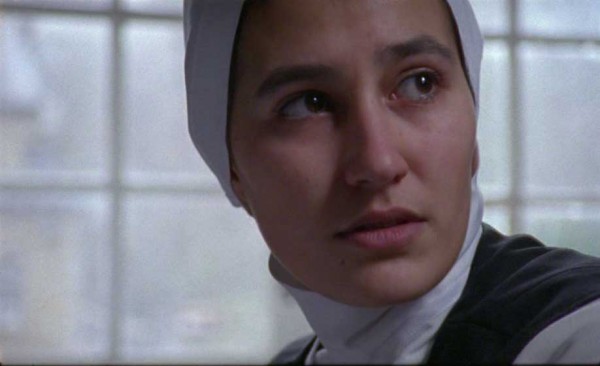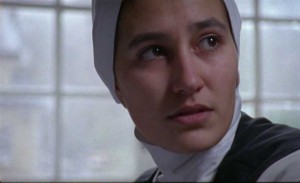-
L’Appel
by Raphael Ruttenberg April 5, 2012
Young director Cecile Mavet has managed something remarkable in her quiet and intensely beautiful short film, L’Appel (The Calling). In twenty minutes, Mavet provides a vignette of a young woman grappling with the profound personal choice of whether to abandon a career in dance (not to mention the entirety of what we take to be a “fulfilling” life) to join an order of nuns in Belgium. What seems like a contrived setting to tease out the protagonist’s spiritual struggle is actually an echo of a deeply modern enterprise: the search for philosophical meaning and spiritual fulfillment in a disenchanted world. It is a story of personal freedom and empowerment, paradoxically situated in what much of contemporary society would consider to be the most restrictive and least individualistic cultural niche.
The historical shift away from a mode of human existence that is deeply imbued with spiritual meaning is the subject of the philosopher Charles Taylor’s seminal work, A Secular Age. Taylor is himself a Catholic, but his work is not a polemic against modern atheism or secularism. Nevertheless, one feels the undercurrent throughout the historical narrative that something about our contemporary existence is lacking, specifically: the availability of an unquestioned belief in God and the pervasiveness of divine influence in the material world as well as one’s social connections. Since our lives have segmented into the “public” non-spiritual modes and the “private” mode of worship and belief, the spiritual mode has necessarily moved to a back-up role. We exist in a secular world in which room has to be carved out for religious belief. Whether or not this development is beneficial to us is unimportant. An intricate change has occurred in Western thought, and we cannot help but grapple with its consequences.
Mavet treats this dilemma explicitly, but does so within the scope of an individual struggling to define her life and satisfy competing desires. Taylor draws a distinction between lay and monastic life in pre-Renaissance Europe along the lines of time: profane and higher time. The very existence of two modes of time is difficult for us moderns to contemplate. Taylor himself toils to define the precise relation of higher time to profane time: “surrounded by, penetrated by; it is hard to find the right words here.” Whatever the relationship, moving into higher time is “an ascent into the unchanging.” In the Middle Ages, like now, joining a monastery is a way to immerse yourself completely in this eternal time. One gets a sense of this removal from the documentary Into Great Silence by Philip Groning, whose request of a Carthusian monastery to let him film the monks in their daily ritual was only answered after 16 years of consideration.
L’Appel is intended as an exploration of the meaning of the monastic commitment in dramatic form. The film opens with the protagonist, Anna, hanging sheets to dry on a clothesline — a familiar act that is quite archaic. The aura of simplicity and nostalgia continues throughout the film. The vestments of the convent are simple and modest, and certainly belong to a different time. The convent itself feels unchanged through many centuries. One gets the sense that entering the convent (Anna is debating whether or not to take her vows) is not born so much from a yearning from the past, as a desire to be taken out of time entirely. This is not an unfamiliar impulse- we often feel enslaved by the trapping of modernity, the ostensible comforts and freedoms allowed by technology. In contrast to the cruel and cowardly subject of Into Into The Wild, Anna’s desire for this life is pure and unmuddled by anger.1
The convent does seem to be the perfect realization of the life devoted to reclaiming the spiritual mode. The Sisters are convivial, and share jokes amongst themselves about past suitors and the difficult process of taking vows. The powerful sense of community and shared love between the Sisters is in rather stark contrast to the Carthusian monks. An inductee to their order wouldn’t feel as if she had severed all social bonds. Contrast is provided to the striving and uncaring outside “modern” world in the form of Anna’s mother. During a visit to the convent, the mother hectors Anna over her inclination to take her vows, and baits her with a story about how Anna’s sister has given birth.2 It is somewhat surprising to hear the nuns speak to frankly about the difficult choice of joining a monastic order, while the visitor from the “free” world outside cannot conceive of an alternative to her lifestyle. Mavet shows us how our boundless freedom has bound us to a proscribed existence.

Mavet also deftly deals with the audience’s likely expectation that Anna is foregoing a great deal of freedom by deciding to join the convent. Anna stands outside of both the dogma of the church she is joining and her mother’s expectations. Despite the film’s suggestion that she is struggling with the choice of pursuing ballet versus taking the vows, the film ends with Anna transforming from a kneeling supplicant before the altar into a creature of ecstatic movement. She reaches everything — body and spirit. The cloister of the convent is not a prison, but the venue in which Anna will thrive. A hint of the oppression of the outside world comes from the mother’s report that Anna’s niece will be named “Moira,” after one of the Fates of Greek mythology. The temporal path of having a career and family is fated, but the life of abstinence and devotion is the product of free will.
This is an unfashionable attitude in filmmaking. Generally, films that expose the flaws and prejudices of modern life do so from a nihilistic standpoint. In Todd Solondz’s Palindromes, the protagonist Aviva is played by ten different actors of various races and genders and ages- personal identity is essentially meaningless, and the bildungsroman is hollowed out of any meaning. Conversely, Andrei Rublev (the only comparable film about monasticism that comes to mind) is about a historical figure who is pivotal to Russian history, not an “everywoman” whose existential struggle mirrors out own.
Mavet’s cleverness in making the convent seem like a palatable option comes across in two ways. First, Anna’s conflict with her mother will resonate with practically everyone. We all face the difficulty in becoming an adult that we disagree with the choices our parents have made for us, and that we may know better than they what to make of our lives. We may also even see our parents, like Anna seems to, as selfish and mean.3 The personal transformation that Anna is undergoing is analogous to coming out of the closet. She has a new identity, which no one can talk her out of, and which furthermore will largely define her existence in the future. Like the woman who becomes aware of her homosexuality, Anna struggles with the questions of identity — Is it a choice? Is it a calling?
The film also functions as a personal catharsis for the director, and the audience can relate to the act of seeing the film as an analogue for joining a convent. Mavet talked to me about the impact of Andrei Tarkovsky’s Sculpting in Time on her vision for her film. L’Appel came out of a stressful period in Mavet’s life. But as Tarkovsky explains, movies can be the cure for our spiritual ailments. They are tickets to a realm of emotion. We are removed by films from our profane time. L’Appel like its subject, seeks to enter eternal time.
- The question of how selfish is this act — removing oneself from mainstream society and one’s family — is an interesting ethical tangle. But Anna, unlike Christopher McCandless, does not act out of anger or abandon her family. This variety of existential quest is much easier to laud as genuine and heroic [↩]
- Anna’s unnamed mother also looks very odd and out-of-place in the convent, dressed in her clothes and make-up. She is a person we would not look at twice on the street, but the surroundings of the convent give us a glimpse at how silly our conventions may appear from the outside. [↩]
- Anna’s mother brings to mind the step-father in Ingmar Bergman’s Fanny and Alexander, though with the neat inversion of the relationship of Church initiate to child. Perhaps this perceived similarity is heightened by the steady, contemplative cinematography that is highly reminiscent of Bergman. In any case, the message that our parents can hurt us emotionally is clear. [↩]


